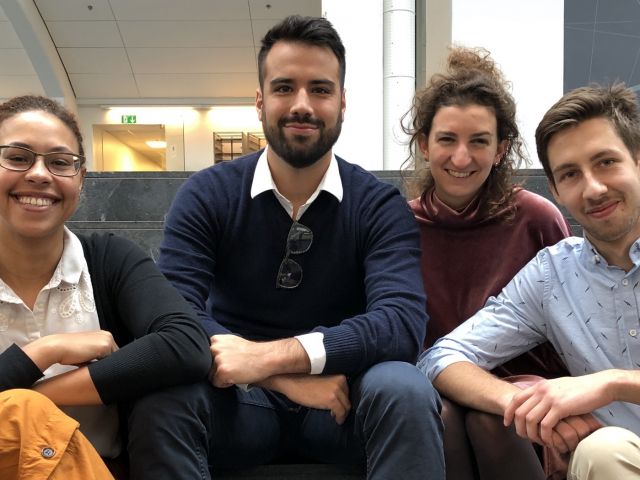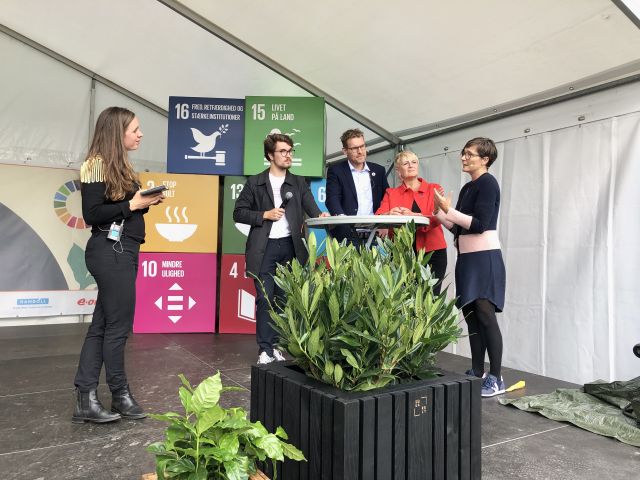Job guide: He cracked the code to the Danish labor market

Oded Yair Menuhin has applied for about 300 jobs. Now, he finally cracked the code on how to get a job in Denmark as an international student. (Photo: Anne M. Lykkegaard)
Is there a way for international students to crack the code and get a job in Denmark? One MSc student currently studying at CBS, Oded Yair Menuhin from Israel, thinks there is. He has applied for about 300 jobs. Based on his experience from job interviews, chats with HR experts and industry professionals, he’s created a guide with all his tricks for increasing the chances of getting a job.
As a student, you need hands-on experience. Yet, landing a job can be quite challenging, especially if you come from a completely different academic background, have no personal network, and don’t speak the local language.
This was the case for Oded Yair Menuhin, who is studying for an MSc in Bioentrepreneurship at CBS. So, he decided to crack the code once and for all. As an international student in Denmark, how do you get your first job?
After consulting HR specialists, industry recruiters and experts, Oded Yair Menuhin has compiled a guide with the top 10 tips that have helped him – and could do the same for you.
“I have applied for many jobs via all the known portals, around 300, I guess. But once I implemented some of these tricks, I started receiving calls for interviews and eventually also job offers,” he says, adding:
“Honestly, this is not quantum mechanics, which is truly complicated. But not knowing these rules of thumb, which might be basic for many people, could result in remaining jobless, even if you are the perfect candidate for the position.”
Here they are. Oded Yair Menuhin’s top 10 tips!
1: Cover letter - one-pager
If you’re familiar with one-pagers from start-ups, it’s very much the same approach. You persuade the person offering the job to invest his/her time and effort in inviting you to the interview and later offering you the position. Therefore, you need the right words for the specific job. When the job ad stipulates prerequisite requirements, you’d better write them down. Then you can slightly modify your generic cover letter to match each individual job ad, emphasizing your competencies for that specific job. Highlight how your specific skills are required for the desired job, and assume that at least 40 other hopeful applicants are writing pretty much the same as you for this job. Tell them what makes you stand out.
2: ATS (Applicant Tracking System)
The notorious ATS that sends ‘We regret to inform you’ letters at 4 a.m. in the morning. No HR employee works at that time (most likely). That’s why you must put the right words in your application based on the job ad. In a nutshell, ATS systems are used when high volumes of applications come flooding in, which is pretty much the case for most of the jobs offered on LinkedIn and other platforms. One of the many problems with the ATS system is that if your CV lacks the specific keywords and requirements stated in the job description, your chances decrease tremendously.
3: Come well prepared for your interview
KNOW everything there is to know about the company and the position. Even watching a few videos on YouTube should suffice. Prepare your strengths and weaknesses. No one expects you to be perfect (except me), and consider whether you would like to hire yourself after hearing those characteristics. You will most likely be asked to give examples of your weaknesses, strengths and skills. Talking about how amazing you are is nice, but you need something to base it on. For example, you say you’re good at planning with an analytical mindset – just like all the other candidates. Give an example that demonstrates your skills.
4: Dress appropriately
YES appearance does matter! It’s not recommended to come overdressed, but first impressions count. Look presentable and show that you made an effort to impress your potential boss. Before the interview, find out how your boss or other employees dress in the workplace.
5: English skills
You might speak English well, but it’s possible you might write something that sounds weird in English without realizing it. So, even if English is your native language, give your application to someone who works in HR/is experienced in hiring, and use a proofreader to make your cover letter and CV as eloquent as possible.
6: Contact the person responsible for the position
Usually, contact information for the hiring manager is at the bottom of the ad. I can say without doubt that using these contact details significantly increased my chances of getting interviews!
7: Smile during the interview
It’s more than OK. Imagine if you had to hire someone. You’d like a new recruit who’s friendly and shows a bit of confidence.
8: Apply straight away, don't wait
I had the pleasure of talking to people who recruit students in many fields, and many of them say that, due to the piles of applications they receive, they only look at the first dozen or so. If the applications from the first pile don’t suffice, only then do they continue to the next pile. The quicker you apply, the better your chances of getting an interview.
9: Search engines
LinkedIn is very common in Denmark, but there are many other job search engines that could be even better for you: Glassdoor, Graduateland, Hub, Neuvoo, Indeed, CBS/other institutions etc. They’re all waiting for you, and many of the jobs are not shown by all the search engines, so check them all. Another trick is to make your LinkedIn profile look as professional and good as your CV and cover letters, because your potential boss might be lurking in cyberspace, reading your profile carefully before considering continuing with your application process.
10: Never give up
I’ve met many people who gave up because of the number of ‘We regret to inform you’ letters they received. Speak to a career consultant, ask industry experts, improve your skills and elaborate on them on your résumé.
I hope these Top 10 tips help, and would be happy to hear your thoughts on the subject.






































































































































Thank you so much for sharing your experience! A definite must-read to all International students who are frustrated applying for jobs in Denmark!